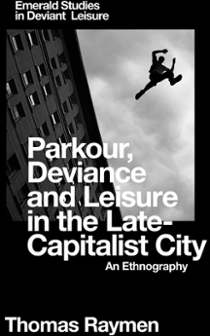Parkour, Deviance and Leisure in the Late-Capitalist City: An Ethnography

Synopsis
Table of contents
(11 chapters)This chapter outlines the book’s rationale and approach in addition to its general argument. It introduces the reader to what the author has described as a ‘paradox’ of parkour, whereby parkour and freerunning is hyper-conformist to the values of consumer capitalism whilst its free practice is excluded and marginalised from urban space. Before offering methodological commentary on the book’s ethnographic approach and outlining the structure of the book, it looks how this paradox is a product of late-capitalism’s own making – making reference to processes of deindustrialisation, neoliberalism and the rise of consumer capitalism.
This explores the evolution of leisure in post-industrial consumer capitalist society, specifically the relationships between work, leisure and identity. It begins by suggesting that in contemporary society the association of leisure with freedom, autonomy, voluntarism, enjoyment and its distinction from work are all obsolete. In doing so, it uses ethnographic and interview data to outline how the popular cultural lifestyle sport of parkour and freerunning conforms to the contemporary values of consumer capitalism and is a product of tectonic changes in the global economy in the latter part of the twentieth century. This goes a long way to dismantle the prevailing wisdom that such forms of spatial transgression are a mode of performative resistance against contemporary capitalism.
This chapter provides an overview and introduction to the book’s theoretical framework which is rooted in ultra-realist criminology theory and transcendental materialism’s innovative conceptualisation of subjectivity. The chapter outlines both of these perspectives and how they differ from existing criminological theory in order to explore both how and why individuals in contemporary society are so committed to the values, symbols and identities of consumer capitalism. The chapter then employs this theoretical framework to problematise and deconstruct the dominant conceptualisation of parkour as a mode of performative resistance, by drawing upon theoretical ideas such as precorporation, the reversal of ideology and interpassivity.
This ethnographic chapter takes the reader into the wider lifeworlds of the ethnographic participants of this study and their entrepreneurial efforts to make a living from the increasingly commodified and sportified world of lifestyle sports. It contextualises this trend within the challenges, barriers and anxieties that surround youth transitions into adulthood in late-capitalism; the increasingly blurred line between work and leisure and the rise of ‘prosumption’ and its impact upon modes of capital accumulation.
This chapter offers a theoretical appraisal of our contemporary hyper-regulated urban spaces situated against a backdrop of deindustrialisation, the shift to consumer economies and the rise of the creative city paradigm. While existing work has characterised urban space as dead and asocial spaces bereft of life. This chapter opts to think our city centres as ‘Zombie Cities’: cities which have been eviscerated the social but are forced to wear the exterior signs of life through the injection of economically productive but artificial modes of culture and creativity. This sets the stage for explaining why parkour is inconsistently included and excluded from urban space, and how it attains spatio-economically contingent legitimacy and inclusion into urban space that problematises existing theoretical perspectives around a revanchist urbanism.
This chapter uses ethnographic data to explore the embodied aspects of parkour’s practice and how traceurs move around and navigate the city. It draws upon a blend of non-representational theory and Lacanian psychoanalysis to explain the attraction to parkour’s intensely embodied, effective and risk-taking practice. It then looks at how the traceurs exist in the interstices of hyper-regulated urban spaces and develop an alternative cartography of the city, which is generated from their situated knowledge and the temporal rhythms and flows in the city centre’s consumer economy. It is argued that this alternative cartography constitutes a spatio-bodily transgression that violates the hyper-regulated city’s command for its subjects to be passive bodies who accept the dominant cartography of the city geared towards consumption.
This chapter draws upon ethnographic observation and walking interviews with private security staff to offer in-depth insight into the hyper-regulation of the city and the lived dynamics of parkour’s inconsistent inclusion and exclusion from urban space. This chapter argues that the street-level governance of urban space is largely incoherent, fractured and characterised by a myriad of conflicting spatial interests. As neoliberalism has privatised and fractured the city into a series of microspheres of spatial sovereignty, there is a lack of any notion of the common urban good; therefore, what should be allowed and prohibited from urban space. This is a manifestation of the broader trend towards post-political forms of governance. It is argued that the confusion and contradiction that surrounds what city spaces should be for actively contributed to the forms of spatial compromise developed between private security and the traceurs.
This chapter brings the book to a close by summarising the overall argument and looking to the future of commodified lifestyle sports and post-industrial cities under an ailing capitalist economy. Most importantly, it calls upon academics to abandon concepts of resistance and social scientific approaches rooted in symbolic interactionism and discursive meanings in order to return to a critical analysis of the real generative mechanisms of political economy. This chapter closes with a brief epilogue that returns to the traceurs and the parkour community in this study one year after the ethnographic fieldwork ended.

- DOI
- 10.1108/9781787438118
- Publication date
- 2018-12-05
- Book series
- Emerald Studies in Deviant Leisure
-
- Series copyright holder
- Emerald Publishing Limited
- ISBN
- 978-1-78743-812-5
- eISBN
- 978-1-78743-811-8